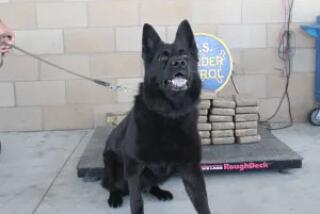Critics Call It Hounding, but Dogs Are Latest Weapon in Just Saying ‘Nose’ to Drugs
- Share via
POMPANO BEACH, Fla. — The boy was up to no good and his parents knew it.
He was staying out late and skipping school. Strangers were coming up to his bedroom window at 2 a.m. But he swore he wasn’t dealing drugs. The parents needed proof to set him straight and they didn’t want him to get arrested.
They called in Corky, an eager, yellow Labrador retriever with a remarkably effective nose.
Effective Nose
“The dog found a quarter-ounce of coke in gram bags in a slit under his rug,” said Gene Panella, who trained 2-year-old Corky to locate even minute amounts of marijuana, cocaine and heroin at $250 a sniff.
Panella, owner of K9 of Broward, has found a lucrative new angle on South Florida’s ever-present drug trade--working for private citizens who want their property to be drug-free--but has also raised the ire of civil libertarians.
“In the past four months, he’s been nearly every other day on a search,” said Panella, who claims Corky has found drugs in 32 of 33 homes.
“Families and corporations are mostly interested in getting help for people on drugs, rather than arresting them. All I’m doing is finding the evidence to confront them with.”
Panella primarily breeds and trains guard dogs, but he decided to branch out after boat owners began calling him for help with the U.S. Coast Guard’s “zero tolerance” policy of confiscating boats found with minimal amounts of drugs on board.
Owner of Yacht
One was the owner of the 135-foot yacht Corky searched in Ft. Lauderdale.
“When we got to the crew’s quarters the dog just went bananas,” Panella said. “The owner fired the crew on the spot. He just dropped them off on the dock.”
Panella said he warns business executives that one offender can leave drug residue all over an office. But he doesn’t worry that the dog might also implicate drug-free employees during his searches.
“I just tell them where it is. The rest is their problem.”
Private employees are not constitutionally protected from drug searches of their workplaces, but the prospect is nevertheless disturbing to civil libertarians.
‘Invasive’ Technology
“It’s funny to think of a dog as high-tech . . . but it’s clear that this is a very highly invasive type of technology,” said Paul Joseph, vice president of the American Civil Liberties Union in Florida. “Our society is going to have to decide whether that is acceptable.”
But Jack Hook of the U.S. Drug Enforcement Administration office in Miami said Panella’s services are sorely needed.
“How else can you stop the lawyer who stops by his favorite crack house on the way home?” Hook said. “I think it’s needed because nothing has been done to stop the users.”
There are other businesses like Panella’s around the country, but “there aren’t very many of them, I’m sure,” said Wayne Bohrer, deputy chief of the DEA’s state and industry section in Washington. Panella said he had been contacted by someone in New York who wanted to start a drug-dog business.
Corky is so much in demand now that Panella is training a 4-month-old beagle named Daffy to handle the overflow.
$6,000 to Train
But dog owners daydreaming of making a fortune off Fido should know that a good drug dog costs about $6,000 to train, and not all types are suited for the work, Panella said.
“The biggest thing about training a drug dog is starting with the right animal. You want the obnoxious, hyper, snotty types,” he said. “You want them to get keyed up.”
Panella has a special dispensation from the DEA to keep the illegal drugs he needs to train his dogs. But the animals never get to eat the drugs that drive them crazy.
“Everybody thinks the dogs are all junkies, but we never let them touch the drugs,” Panella said. “I’ve seen dogs get stoned out, and they’re never the same after that.”
More to Read
Sign up for Essential California
The most important California stories and recommendations in your inbox every morning.
You may occasionally receive promotional content from the Los Angeles Times.










